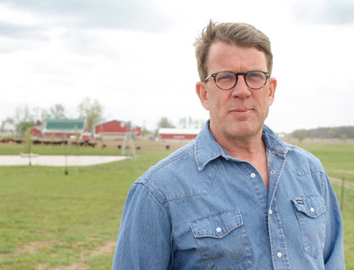Subscriber Benefit
As a subscriber you can listen to articles at work, in the car, or while you work out. Subscribe NowExactTarget co-founder Chris Baggott and his business partners have sold Greenfield-based food startup Husk LLC after nearly three years in business, turning their attention to newer food-related ventures.
Connersville-based Lifeline Farms LLC purchased Husk for an undisclosed price at the end of 2015, assuming its brands and processing center. Lifeline initiated interest in buying Husk, co-founder Nick Carter said, and was the only potential suitor. Husk was profitable, Carter said.
Baggott, Carter and fifth generation farmer Adam Moody started Husk in May 2013 to increase access to locally grown food by preserving, processing and getting it on the shelves of grocery stores. It had about seven full-time workers on average, Carter said.
Besides brokering deals between local farmers and grocers, Husk made money by selling in-house products to retailers and co-packing services to food entrepreneurs, reaching more than 300 grocery stores across five Midwest states.
"Chris and I are both technology entrepreneurs at heart," Carter said, "and we had built Husk to a level that, to continue growing it needed someone with a manufacturing focus and a real keen knowledge of the grocery industry."
Husk was one of several food-related operations Baggott jumped into after leaving marketing technology firms ExactTarget in 2006 and Compendium in 2013, including Tyner Pond Farms and, more recently, ClusterTruck LLC.
After raising $2 million in seed funding, Baggott has started renovating ClusterTruck’s first home—the former Indiana Pharmacists Alliance building at 729 N. Pennsylvania St.—with hopes of starting operations in mid-March. He's CEO of the firm, which has taken on local restaurateur Mike Cunningham as a partner.
All three Husk founders are involved with a new business venture called Farmersmarket.com, which effectively virtualizes the physical markets that farmers and food artisans primarily use to reach consumers. Baggott is chairman.
The site allows people in a neighborhood to browse the local fare online, order, and pick up it up from a so-called "Market Host" weekly.
It hopes to eventually offer home delivery. Carter said 27 farmers and artisans are on board, and he expects to have 100 by the end of the year.
"We want to create more markets for local food beyond grocery stores," Carter said. "We realize that the lack of access that local producers have to grocery stores is a challenge, … so we're providing local e-commerce ordering and local pickup points."
Please enable JavaScript to view this content.

